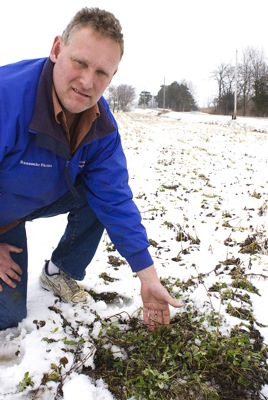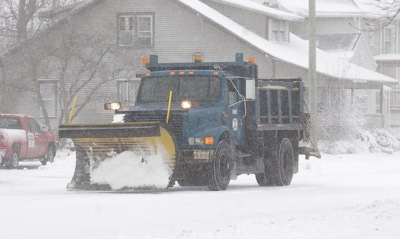Friday, February 25th, 2011
Farmers need to heed rules
By Nancy Allen

Photo by Mark Pummell/The Daily Standard
Celina area farmer Jeff Rasawehr kneels in a field he planted with red clover, a type of winter cover crop. Having at least 90 percent of vegetative cover is one requirement of the new rules for wintertime manure application in the Grand Lake Watershed. Cover crops help prevent manure from running off the land when snow melts or rain arrives.
GRAND LAKE - If ag producers don't step up, their livelihoods could be at stake, according to a local agriculture official.
Chris Gibbs, executive director of the Mercer County Farm Service Agency and a defender of livestock production practices, is frustrated by a recent improper manure spreading incident, even though it occurred outside the Grand Lake Watershed. He said it shouldn't have happened at all.
"The recent actions of a few fly in the face of both this office and our conservation partners at the Mercer Soil and Water Conservation District and Natural Resource Conservation Service," Gibbs said in a written statement. "As much as it hurts me to admit it, all the education efforts we've promoted to policy makers pale in comparison to the learning curve that can be obtained from stiff fines levied through administrative penalties and the court bench."
Gibbs was reacting to a serious incident that occurred last week at the corner of state routes 29 and 49 when a large amount of dairy manure runoff went into two streams and the Wabash River. One of the farm's owners admitted he didn't have to spread on the field - the farm had enough manure storage - and he was aware spreading on frozen and/or snow-covered ground was not a recommended practice.
There have been nine recent complaints of improper manure spreading; only three were located inside the lake watershed where farmers must adhere to stricter wintertime manure rules.
For farmers outside the watershed, the rules are only recommended - not mandatory.
"You can tell driving between the Grand Lake, Wabash, St. Marys and Fort Loramie watersheds that producers in the Grand Lake Watershed are aware of 633 (federal manure rules) and are trying to follow it," said Frances Springer, part of a team working with watershed farmers. "You see it in the setbacks, application rates and that they're spreading on fields with (vegetative) cover."
Of the three complaints in the lake watershed, two were deemed valid because not all precautions for wintertime application were followed. Neither resulted in any runoff, Mercer County Soil and Water Conservation District (SWCD) Technician Matt Heckler said.
The six that occurred outside the watershed produced runoff, mostly because application rates were exceeded and setbacks were too close or didn't exist, he said.
The Ohio EPA is looking into two of those incidents - the one at state routes 29 and 49 and another where a farmer improperly applied Celina Wastewater Treatment Plant sludge to a snow-covered field.
The state has designated the Grand Lake Watershed as distressed because of last summer's toxic algae blooms in the lake. The status triggered the new manure rules.
Heckler and Springer are part of a team of local, state and federal officials who have been working the last two years to help farmers change manure management practices to reduce runoff. The toxic algae is fed by phosphorous, most of which runs off farmland in the 58,000-acre watershed. Millions in federal funds have been steered to the watershed to help farmers with conservation practices, including extra manure storage.
Heckler and Springer said they weren't surprised there were violations in the watershed, because it's the first winter for the new rules. Farmers who had issues the last couple of weeks listened and learned from it, they said. The most common violation dealt with not following setbacks.
"I think a lot of guys think they are 200 feet away and don't realize they aren't because they didn't step it off," said Springer, an Auglaize County SWCD employee.
Both say they are talking with farmers they have never dealt with before, which is good. Others, however, remain oblivious.
"There are still some that don't know (about the new manure rules)," Heckler said. "They act like they are living under a rock, but most of those aren't full-time farmers."
Another problem is that some farmers haven't explained the rules to employees or family members spreading the manure.
"It's the responsibility of the operator to relay that info to employees," Heckler said.
Heckler and Springer would not comment when asked if they were frustrated about the recent manure violations. They said farmers following good conservation practices are unhappy with those who aren't.
"I definitely see frustration with the ones trying to do a good job," Springer said.
Jim Hoorman, Mercer County OSU Extension educator, said he wasn't surprised about recent manure violations, saying farmers "just weren't ready" for the new rules. Some are confused about the rules, while others just aren't paying attention, he said.
Hoorman said all farmers should store their manure when the ground is ice and/or snow-covered if they have the option.
"When you've got that much snow and ice, those are less than ideal conditions to put it out there," he said. "If you have a choice between storing it or putting it out there, you need to store it."
Former Mercer County poultry and fish farmer Jim Zehringer, who is now director of the Ohio Department of Agriculture, said his office is working with local farmers to help them act responsibly so they can begin restoring the lake.
Zehringer promised to go after violators.
"Farmers who continue to exercise bad practices create problems not only for themselves, but also for other farmers, for the lake, those who make their living from it and for those who enjoy fishing and boating on it," he said in a written statement. "We can't tolerate bad actors, and we're going to bring them into compliance."
Manure guidelines:
Farmers in the Grand Lake Watershed now must follow all 633 guidelines when applying manure to frozen and/or snow-covered ground. This includes following setbacks from streams, side ditches, residences and wells, lower application rates and applying on fields with cover crops or corn residue left from grain harvest.
In 2013, lake watershed farmers will be banned from spreading manure between Dec. 15 and March 1 and also when the ground is frozen outside those dates unless a farmer gets prior state approval.
The enforcement protocol for violating 633 guidelines is:
First offense: The farmer will be sent a letter from local soil and water officials explaining why the violation was issued and outlining the new manure rules.
Second offense: May result in expedited orders to comply by the chief of the state's division of soil and water.
Third offense: Civil penalties.
For more information on new manure rules for the Grand Lake Watershed or other conservation questions, call the Mercer County SWCD office at 419-586-3289 or the Auglaize SWCD office at 419-738-4782.



